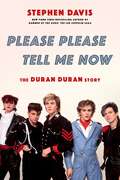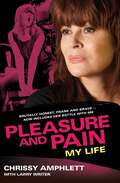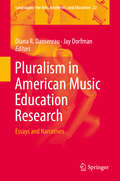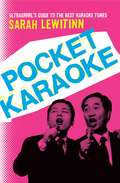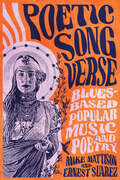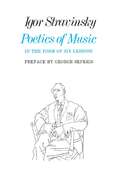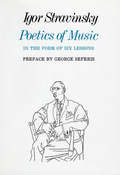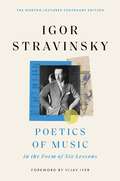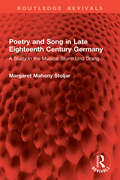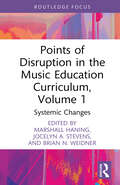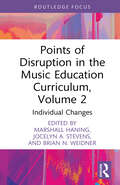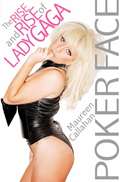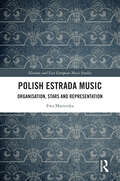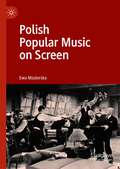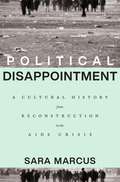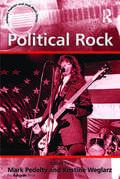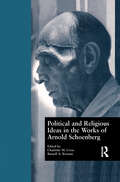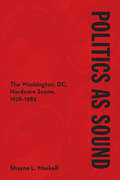- Table View
- List View
Please Please Tell Me Now: The Duran Duran Story
by Stephen DavisLifelong fans and interested newcomers will love this stunning biography of Duran Duran by the bestselling author of Gold Dust Woman and Hammer of the Gods.In Please Please Tell Me Now, bestselling rock biographer Stephen Davis tells the story of Duran Duran, the quintessential band of the 1980s. Their pretty boy looks made them the stars of fledgling MTV, but it was their brilliant musicianship that led to a string of number one hits. By the end of the decade, they had sold 60 million albums; today, they've sold over 100 million albums—and counting.Davis traces their roots to the austere 1970s British malaise that spawned both the Sex Pistols and Duran Duran—two seemingly opposite music extremes. Handsome, British, and young, it was Duran Duran that headlined Live Aid, not Bob Dylan or Led Zeppelin. The band moved in the most glamorous circles: Nick Rhodes became close with Andy Warhol, Simon LeBon with Princess Diana, and John Taylor dated quintessential British bad girl Amanda De Cadanet. With timeless hits like "Hungry Like the Wolf," "Girls on Film," "Rio," "Save a Prayer," and the bestselling James Bond theme in the series' history, "A View to Kill," Duran Duran has cemented its legacy in the pop pantheon—and with a new album and a worldwide tour on the way, they show no signs of slowing down anytime soon. Featuring exclusive interviews with the band and never-before-published photos from personal archives, Please Please Tell Me Now offers a definitive account of one of the last untold sagas in rock and roll history—a treat for diehard fans, new admirers, and music lovers of any age.
Pleasure and Pain: My Life
by Chrissy Amphlett Larry WriterChrissy Amphlett is a true legend of Australian rock?n?roll. Here, the spellbinding performer who inspired and outraged as lead singer of the Divinyls tells her own amazing story.In this raw, gripping and searingly honest account, Chrissy spares no one ? least of all herself. She reveals how she formed the Divinyls and, with a unique voice, steely ambition and an outrageous stage act powered them to Australian and international stardom.Having battled alcohol, drugs and a million dollars worth of debt, Chrissy tells of her fight with MS and of finally finding peace with the love of her life in New York.Brave, sad, funny, ferocious, there's never been anyone like Chrissy Amphlett.
Pleasure and Pain: My life
by Chrissy Amphlett Larry WriterChrissy Amphlett is a true legend of Australian rock’n’roll. Here, the spellbinding performer who inspired and outraged as lead singer of the Divinyls tells her own amazing story.In this raw, gripping and searingly honest account, Chrissy spares no one – least of all herself. She reveals how she formed the Divinyls and, with a unique voice, steely ambition and an outrageous stage act powered them to Australian and international stardom.Having battled alcohol, drugs and a million dollars worth of debt, Chrissy tells of her fight with MS and of finally finding peace with the love of her life in New York.Brave, sad, funny, ferocious, there's never been anyone like Chrissy Amphlett.
Pluralism in American Music Education Research: Essays and Narratives (Landscapes: the Arts, Aesthetics, and Education #23)
by Diana R. Dansereau Jay DorfmanThis volume examines pluralism in light of recent music education research history and pluralistic approaches in practice. Pluralistic research holds the potential to blend frameworks, foundations, methods, and analysis protocols, and leads to a sophisticated understanding of music teaching and learning. This blending could take place in a range of contexts that may span an individual study to a lifelong research agenda. Additionally, pluralistic ideals would guide the addressing of questions as a community. The volume also illuminates the work of innovative music education researchers who are constructing pluralistic research studies and agendas, and advocate for the music education profession to embrace such an approach in order to advance shared research goals. The ramifications of this transformation in music education research are a subject of discussion, including the implications for researcher education and the challenges inherent in conducting and disseminating such research.
Po' Monkey's: Portrait of a Juke Joint
by Will JacksOutside of Merigold, Mississippi, off an unmarked dirt road, stands Po’ Monkey’s, perhaps the most famous house in Mississippi and the last rural juke joint in the state, now closed to the public. Before the death of the lounge’s owner, Willie Seaberry, in 2016, it was a mandatory stop on the constant blues pilgrimage that flows through the Delta. Seaberry ran Po’ Monkey’s Lounge for more than fifty years, opening his juke joint in the 1960s. A hand-built tenant home located on the plantation where Seaberry worked, Po’ Monkey’s was a place to listen to music and drink beer—a place to relax where everyone was welcomed by Seaberry’s infectious charm. In Po’ Monkey’s: Portrait of a Juke Joint, photographer Will Jacks captures the juke joint he spent a decade patronizing. The more than seventy black-and-white photographs featured in this volume reflect ten years of weekly visits to the lounge as a regular—a journal of Jacks’s encounters with other customers, tourists, and Willie Seaberry himself. An essay by award-winning writer Boyce Upholt on the cultural significance of the lounge accompanies the images. This volume explores the difficulties of preservation, historical context, community relations, and cultural tourism. Now that Seaberry is gone, the uncertainty of the future of his juke joint highlights the need for a historical record.
Pocket Karaoke
by Sarah LewitinnYour nights of poring over massive karaoke binders are over! With more than two thousand songs handpicked and organized by music industry insider and DJ Sarah Lewitinn (a.k.a. Ultragrrrl), Pocket Karaoke is the definitive, portable guide to making your next karaoke performance unforgettable -- in all the right ways. This must-have reference book includes: SONG LISTS BY ARTIST: Featuring all of the best artists, along with levels of difficulty, drink minimums, performance tips, and similar artists. SONG LISTS BY GENRE: From oldies to new wave, disco to emo, funk to hip-hop, all the crowd-pleasing favorites are listed here. SONG LISTS BY CELEBRITIES: More than thirty musicians, DJs, and journalists list their top five favorite songs to perform at karaoke and why. SONG LISTS BY OCCASION: With duets, seductive little ditties, roof-raising party-starters, and more. Plus KARAOKE GEAR -- where to buy online, all-in-one systems, and computer programs to take your obsession to the next level!
Pocket Karaoke
by Sarah LewitinnYour nights of poring over massive karaoke binders are over! With more than two thousand songs handpicked and organized by music industry insider and DJ Sarah Lewitinn (a.k.a. Ultragrrrl), Pocket Karaoke is the definitive, portable guide to making your next karaoke performance unforgettable -- in all the right ways. This must-have reference book includes: SONG LISTS BY ARTIST: Featuring all of the best artists, along with levels of difficulty, drink minimums, performance tips, and similar artists. SONG LISTS BY GENRE: From oldies to new wave, disco to emo, funk to hip-hop, all the crowd-pleasing favorites are listed here. SONG LISTS BY CELEBRITIES: More than thirty musicians, DJs, and journalists list their top five favorite songs to perform at karaoke and why. SONG LISTS BY OCCASION: With duets, seductive little ditties, roof-raising party-starters, and more. Plus KARAOKE GEAR -- where to buy online, all-in-one systems, and computer programs to take your obsession to the next level!
Poetic Song Verse: Blues-Based Popular Music and Poetry
by Ernest Suarez Mike MattisonPoetic Song Verse: Blues-Based Popular Music and Poetry invokes and critiques the relationship between blues-based popular music and poetry in the twentieth and twenty-first centuries. The volume is anchored in music from the 1960s, when a concentration of artists transformed modes of popular music from entertainment to art-that-entertains. Musician Mike Mattison and literary historian Ernest Suarez synthesize a wide range of writing about blues and rock—biographies, histories, articles in popular magazines, personal reminiscences, and a selective smattering of academic studies—to examine the development of a relatively new literary genre dubbed by the authors as “poetic song verse.” They argue that poetic song verse was nurtured in the fifties and early sixties by the blues and in Beat coffee houses, and matured in the mid-to-late sixties in the art of Bob Dylan, the Beatles, the Rolling Stones, the Doors, Jimi Hendrix, Joni Mitchell, Leonard Cohen, Gil Scott-Heron, Van Morrison, and others who used voice, instrumentation, arrangement, and production to foreground semantically textured, often allusive, and evocative lyrics that resembled and engaged poetry. Among the questions asked in Poetic Song Verse are: What, exactly, is this new genre? What were its origins? And how has it developed? How do we study and assess it? To answer these questions, Mattison and Suarez engage in an extended discussion of the roots of the relationship between blues-based music and poetry and address how it developed into a distinct literary genre. Unlocking the combination of richly textured lyrics wedded to recorded music reveals a dynamism at the core of poetic song verse that can often go unrealized in what often has been considered merely popular entertainment. This volume balances historical details and analysis of particular songs with accessibility to create a lively, intelligent, and cohesive narrative that provides scholars, teachers, students, music influencers, and devoted fans with an overarching perspective on the poetic power and blues roots of this new literary genre.
Poetics of Music
by Igor Stravinsky Arthur Knodel Ingolf DahlThese lessons provide penetrating glimpses into the thought processes of Stravinsky's mind. While dealing with his chosen topics-the phenomenon of music, the composition of music, musical typology, the avatars of Russian music, and the performance of music-he reveals his reverence for tradition, order and discipline. He believes 'the more art is controlled, limited, worked over, the more it is free. His opinions about Wagner, Verdi, Berlioz, Hindemith, Weber, Beethoven, Glinka, Tchaikovsky, Moussorgsky and Bach are refreshing. He also analyzes the function of the critic, the requirements of the interpreter, the state of Russian music, and musical taste and snobbery." - The American Recorder Once again the concertgoer and music lover can take pleasure in Igor Stravinsky's thoughts on the essentials of music. It was over thirty years ago that Stravinsky delivered the Charles Eliot Norton Lectures at Harvard University on which the French-language edition of this book and later the English translation by Arthur Knodel and Ingolf Dahl were based. Now his Poetics of Music is available in paper-with a preface by George Seferis.
Poetics of Music in the Form of Six Lessons (Charles Eliot Norton Lectures (hup) Ser. #2003)
by Igor StravinskyOne of the greatest of contemporary composers has here set down in delightfully personal fashion his general ideas about music and some accounts of his own experience as a composer. Every concert-goer and lover of music will take keen pleasure in his notes about the essential features of music, the process of musical composition, inspiration, musical types, and musical execution. Throughout the volume are to he found trenchant comments on such subjects as Wagnerism, the operas of Verdi, musical taste, musical snobbery, the influence of political ideas on Russian music under the Soviets, musical improvisation as opposed to musical construction, the nature of melody, and the function of the critic of music. Musical people of every sort will welcome this first presentation in English of an unusually interesting book.
Poetics of Music in the Form of Six Lessons (The Charles Eliot Norton lectures ; #1939-1940)
by Igor StravinskyTimeless lessons on the pleasures of listening, the dilemmas of composition, and the meaning of artistic freedom from a founder of musical modernism.In October 1939, Igor Stravinsky took the stage at Harvard not as a conductor but as a speaker. Invited to deliver the prestigious Norton Lectures, he had departed Europe just days after the outbreak of war, leaving behind not only a growing political maelstrom but also his life in France, where his wife, eldest daughter, and mother all had died in the previous year.Poetics of Music offers a snapshot of this pivotal moment in the composer’s biography and career. Delivered at the height of his neoclassical period, which blended the sculptural precision of classicism with distinctively twentieth-century cadences, Stravinsky’s lectures explore both the creative potential and the constraints of tradition. Though he achieved artistic immortality as a genre-defying experimentalist who scandalized audiences in Belle Époque Paris, the Stravinsky we find here is more circumspect, defending the dignity of formal conventions against the more anarchic currents of modernist experimentation. Tradition, he argues, is not a relic of a bygone past but a living force that animates the present. And true artistic freedom emerges not only in moments of revolutionary inspiration but also through strict deference to the formal requirements of the work.Like his compositions, Stravinsky’s lectures are ambitious and at times bombastic, punctuated by wit and polemic. Ranging widely from the phenomenology of rhythm to the fate of high culture in the Soviet Union, he invites us to reflect on what it is in music that compels us, whether we are hearing one of his polytonal works or a simple birdsong.
Poetry and Song in Late Eighteenth Century Germany: A Study in the Musical Sturm Und Drang (Routledge Revivals)
by Margaret Mahony StoljarThe German Lied in the period preceding Mozart is less well-known than that of the florescence under Schubert, Schumann and Wolf. But in Poetry and Song in Late Eighteenth Century Germany (originally published in 1985) Margaret Stoljar shows that the songs composed by C.P.E. Bach and his contemporaries have an interest and allure of their own. She concentrates her analysis on the interplay of poets and musicians, the use made by composers of the work of such distinguished poets as Klopstock, and the specific contribution that music was able to make to the reception of the poetry.As much a work of social history as of musicology, Poetry and Song in Late Eighteenth Century Germany casts a fascinating light on the leisure of the period and place, as well as on the development of taste and sensibility that prepared the way for Young Werther. The book is illustrated with examples of music.
Poetry in English and Metal Music: Adaptation and Appropriation Across Media
by Arturo Mora-RiojaMany metal songs incorporate poetry into their lyrics using a broad array of techniques, both textual and musical. This book develops a novel adaptation, appropriation, and quotation taxonomy that both expands our knowledge of how poetry is used in metal music and is useful for scholars across adaptation studies broadly. The text follows both a quantitative and a qualitative approach. It identifies 384 metal songs by 224 bands with intertextual ties to 146 poems written by fifty-one different poets, with a special focus on Edgar Allan Poe, John Milton's Paradise Lost and the work of WWI's War Poets. This analysis of transformational mechanisms allows poetry to find an afterlife in the form of metal songs and sheds light on both the adaptation and appropriation process and on the semantic shifts occasioned by the recontextualisation of the poems into the metal music culture. Some musicians reuse – and sometimes amplify – old verses related to politics and religion in our present times; others engage in criticism or simple contradiction. In some cases, the bands turn the abstract feelings evoked by the poems into concrete personal experiences. The most adventurous recraft the original verses by changing the point of view of either the poetic voice or the addressed actors, altering the vocaliser of the narrative or the gender of the protagonists. These mechanisms help metal musicians make the poems their own and adjust them to their artistic needs so that the resulting product is consistent with the expectations of the metal music culture.
Poetry in Motion (High School Musical: Stories from East High #3)
by Alice AlfonsiEveryone at East High is freaking out. In one week, the students in Ms. Barrington's English class will have to recite an original poem in front of the whole school! Chad is usually happy to ham it up no matter who is watching, but the embarrassing memory of a past poetry performance is seared onto his brain--and he's not sure he'll be able to pull off this assignment. Troy enlists Gabriella to teach Chad and the other basketball players that there's more than one way to bust a rhyme. But will she be able to save them from schoolwide humiliation?
Points of Disruption in the Music Education Curriculum, Volume 1: Systemic Changes (CMS Pedagogies and Innovations)
by Marshall Haning Jocelyn A. Stevens Brian N. WeidnerFor decades, scholars in the field of music education have recognized the need for growth and change in our approach to teaching music, yet despite these calls for change, the music education curriculum today remains remarkably similar to that of a century ago. Points of Disruption in the Music Education Curriculum, Volume 1: Systemic Changes is one of two volumes that bring together applied suggestions, analyses, and best practices for disrupting cycles of replication in the curriculum of K-12 and collegiate music education programs in the United States and beyond, considering disruption as a force for positive change. Identifying specific strategies for interrupting or reimagining traditional practices, the contributors provide music teachers and music educators with a variety of potential practical approaches to creating changes that foster a better musical education at all levels of the curriculum.This first volume focuses on systemic changes, including topics like professional development, hiring practices, ableism and universal design, rhizomatic learning, and how to implement disruption across the music education profession. Each chapter contains specific action steps and suggestions for implementation. Bringing together five thought-provoking chapters, this concise volume offers a diverse set of concrete strategies that will be useful to a wide range of music education stakeholders, including teachers, administrators, and curriculum designers.
Points of Disruption in the Music Education Curriculum, Volume 2: Individual Changes (CMS Pedagogies and Innovations)
by Marshall Haning Jocelyn A. Stevens Brian N. WeidnerFor decades, scholars in the field of music education have recognized the need for growth and change in our approach to teaching music, yet despite these calls for change, the music education curriculum today remains remarkably similar to that of a century ago. Points of Disruption in the Music Education Curriculum, Volume 2: Individual Changes is one of two volumes that bring together applied suggestions, analyses, and best practices for disrupting cycles of replication in the curriculum of K-12 and collegiate music education programs in the United States and beyond, considering disruption as a force for positive change. Identifying specific strategies for interrupting or reimagining traditional practices, the contributors provide music teachers and music educators with a variety of potential practical approaches to creating changes that foster a better musical education at all levels of the curriculum.This second volume focuses on changes that can be implemented by individual educators, covering topics including transcultural approaches, student-teacher power relations, methods courses, integrated music education, and administrator support of teacher agency, student–teacher power relations, and reimagining music education. Bringing together 6 thought-provoking chapters, this book offers a diverse set of concrete strategies that will be useful to a wide range of music education stakeholders, including teachers, administrators, and curriculum designers.
Poker Face: The Rise and Rise of Lady Gaga
by Maureen CallahanIn just a two-year span, Stefani Germanotta, a struggling performer in New York's Lower East Side burlesque scene, has become the global demographic-smashing pop icon known as Lady Gaga. She is a once-in-a-decade artist, a gifted singer, composer, designer, and performance artist who mixes high and low culture, the avant-garde with the accessible, authenticity with artifice.Who is Lady Gaga? She is a twenty-five-year-old woman whose stage mantra--"I'm a free bitch!"--is the polar opposite of who she is offstage: isolated, insecure, and unable to be alone. She is an outrÉ artist who wanted to be a sensitive singer-songwriter. She is a woman who says no man can ever compete with her career, but who goes back and forth with the ex-boyfriend who said she was too ambitious. She claims not to care what people think, but spends her downtime online, reading what people have to say about her. She claims to be a con artist and utterly authentic. She is never less than compelling.Based on more than fifty original interviews with friends, employees, rivals, and music industry veterans, Poker Face is the first in-depth biography of the extraordinary cultural phenomenon that is Lady Gaga.
Polish Estrada Music: Organisation, Stars and Representation (Slavonic and East European Music Studies)
by Ewa MazierskaPolish estrada music dominated Polish popular music throughout the state socialist period but gained little attention from popular music scholars because it was regarded as being of low quality and politically conformist. Ewa Mazierska carefully examines these assumptions, considering those institutions which catered for the needs of estrada artists and their fans, the presence of estrada in different media and the careers and styles of the leading stars, such as Mieczysław Fogg, Irena Santor, Violetta Villas, Anna German, Jerzy Połomski, Maryla Rodowicz, Zdzisława Sośnicka, Zbigniew Wodecki and Krzysztof Krawczyk. Mazierska also discusses the memory and legacy of estrada music in the post-communist period. The book draws on Poland’s cultural and political history and the history of Polish popular music and media, including television and radio. Mazierska engages with concepts such as genre, stardom and authenticity in order to capture the essence of Polish estrada music and to provide a comparison with popular music produced in other countries.
Polish Jewish Culture Beyond the Capital: Centering the Periphery
by Zehavit Stern Ela Bauer Naomi Seidman Daniel Kupfert Heller Marcos Silber Justin Cammy Eugenia Prokop-Janiec Bozena Shallcross Malgorzata Stolarska-Fronia Magdalena Kozlowska Sylwia Jakubczyk-Sleczka Alicja Maslak-MaciejewskaPolish Jewish Culture beyond the Capital: Centering the Periphery is a path-breaking exploration of the diversity and vitality of urban Jewish identity and culture in Polish lands from the second half of the nineteenth century to the outbreak of the Second World War (1899–1939). In this multidisciplinary essay collection, a cohort of international scholars provides an integrated history of the arts and humanities in Poland by illuminating the complex roles Jews in urban centers other than Warsaw played in the creation of Polish and Polish Jewish culture. Each essay presents readers with the extraordinary production and consumption of culture by Polish Jews in literature, film, cabaret, theater, the visual arts, architecture, and music. They show how this process was defined by a reciprocal cultural exchange that flourished between cities at the periphery—from Lwów and Wilno to Kraków and Łódź—and international centers like Warsaw, thereby illuminating the place of Polish Jews within urban European cultures. Companion website (https://polishjewishmusic.iu.edu)
Polish Popular Music on Screen
by Ewa MazierskaThis book examines the interface between Polish popular music and screen media against the background of Polish history, cinema, and popular culture and situates that interface in a local as well as global context. It looks at Polish musicals, biographical films about musicians, documentary films and, finally, music videos. The author draws attention to the immense popularity of musical comedies in Polish interwar cinema, the enduring appeal of musical genres during the period of state socialism, despite their low status in film criticism, and the re-birth of musicals in the 2010s. Mazierska also discusses the most important stars, directors and authors of songs presented in Polish films, and points to the effect of technological changes on inception and transformation of music-centred genres of screen media, including the effect of YouTube on their growth and preservation. The book is informed by the question of how parochial and universal is Polish popular music and its screen representation.
Political Beethoven
by Nicholas MathewMusicians, music lovers and music critics have typically considered Beethoven's overtly political music as an aberration; at best, it is merely notorious, at worst, it is denigrated and ignored. In Political Beethoven Nicholas Mathew returns to the musical and social contexts of the composer's political music throughout his career – from the early marches and anti-French war songs of the 1790s to the grand orchestral and choral works for the Congress of Vienna – to argue that this marginalized functional art has much to teach us about the lofty Beethovenian sounds that came to define serious music in the nineteenth century. Beethoven's much-maligned political compositions, Mathew shows, lead us into the intricate political and aesthetic contexts that shaped all of his oeuvre, thus revealing the stylistic, ideological and psycho-social mechanisms that gave Beethoven's music such a powerful voice – a voice susceptible to repeated political appropriation, even to the present day.
Political Disappointment: A Cultural History from Reconstruction to the AIDS Crisis
by Sara Marcus“Political Disappointment is an abundant text, overflowing with Sara Marcus’s considerable gifts. She is adept at presenting history and narrative with equal clarity; her writing is urgent but also optimistic. This is a book that is sometimes painful but never sacrifices hope or beauty.”—Hanif AbdurraqibMoving from the aftermath of Reconstruction through the AIDS crisis, a new cultural history of the United States shows how artists, intellectuals, and activists turned political disappointment—the unfulfilled desire for change—into a basis for solidarity.Sara Marcus argues that the defining texts in twentieth-century American cultural history are records of political disappointment. Through insightful and often surprising readings of literature and sound, Marcus offers a new cultural history of the last century, in which creative minds observed the passing of moments of possibility, took stock of the losses sustained, and fostered intellectual revolutions and unexpected solidarities.Political Disappointment shows how, by confronting disappointment directly, writers and artists helped to produce new political meanings and possibilities. Marcus first analyzes works by W. E. B. Du Bois, Charles Chesnutt, Pauline Hopkins, and the Fisk Jubilee Singers that expressed the anguish of the early Jim Crow era, during which white supremacy thwarted the rebuilding of the country as a multiracial democracy. In the ensuing decades, the Popular Front work songs and stories of Lead Belly and Tillie Olsen, the soundscapes of the civil rights and Black Power movements, the feminist poetry of Audre Lorde and Adrienne Rich, and the queer art of Marlon Riggs and David Wojnarowicz continued building the century-long archive of disappointment. Marcus shows how defeat time and again gave rise to novel modes of protest and new forms of collective practice, keeping alive the dream of a better world.Disappointment has proved to be a durable, perhaps even inevitable, feature of the democratic project, yet so too has the resistance it precipitates. Marcus’s unique history of the twentieth century reclaims the unrealized desire for liberation as a productive force in American literature and life.
Political Rock (Ashgate Popular and Folk Music Series)
by Kristine WeglarzPolitical Rock features luminary figures in rock music that have stood out not only for their performances, but also for their politics. The book opens with a comparative, cultural history of artists who have played important roles in social movements. Individual chapters are devoted to The Clash and Fugazi, Billy Bragg, Bob Dylan, Rage Against the Machine, Pearl Jam, Sinead O'Connor, Peter Gabriel, Ani DiFranco, Bruce Cockburn, Steve Earle and Kim Gordon. These artists have been chosen for their status as rock musicians and connections to political moments, movements, and art. The artists and authors show that rock retains a critical strain, continuing a tradition of rock politics that matters to fans, activists, and movements alike.
Political and Religious Ideas in the Works of Arnold Schoenberg (Border Crossings #Vol. 5)
by Daniel Albright Russell A. Berman Charlotte M. CrossThe original essays in this collection chronicle the transformation of Arnold Schoenberg's works from music as pure art to music as a vehicle of religious and political ideas, during the first half of the twentieth century. This interdisciplinary volume includes contributions from musicologists, music theorists, and scholars of German literature and of Jewish studies.
Politics as Sound: The Washington, DC, Hardcore Scene, 1978-1983 (Music in American Life)
by Shayna MaskellUncompromising and innovative, hardcore punk in Washington, DC, birthed a new sound and nurtured a vibrant subculture aimed at a specific segment of the city's youth. Shayna L. Maskell explores DC's hardcore scene during its short but storied peak. Led by bands like Bad Brains and Minor Threat, hardcore in the nation's capital unleashed music as angry and loud as it was fast and minimalistic. Maskell examines the music's aesthetics and the unique impact of DC's sociopolitical realities on the sound and the scene that emerged. As she shows, aspects of the music's structure merged with how bands performed it to put across distinctive representations of race, class, and gender. But those representations could be as complicated and contradictory as they were explicit. A fascinating analysis of a punk rock hotbed, Politics as Sound tells the story of how a generation created music that produced--and resisted--politics and power.
